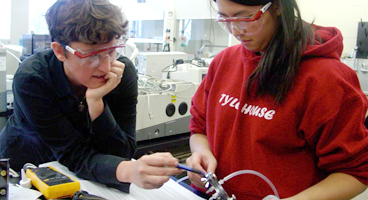Document Type
Article
Publication Date
9-3-2013
Publication Title
Proceedings of the National Academy of Sciences of the United States of America
Abstract
Central nervous system tumors carry grave clinical prognoses due to limited effectiveness of surgical resection, radiation, and chemotherapy. Thus, improved strategies for brain tumor visualization and targeted treatment are critically needed. We demonstrate that mouse cerebellar medulloblastoma (MB) can be targeted and illuminated with a fluorescent, engineered cystine knot (knottin) peptide that binds with high affinity to α β , α β , and α β integrin receptors. This integrin-binding knottin peptide, denoted EETI 2.5F, was evaluated as a molecular imaging probe in both orthotopic and genetic models of MB. Following tail vein injection, fluorescence arising from dye-conjugated EETI 2.5F was localized to the tumor compared with the normal surrounding brain tissue, as measured by optical imaging. The imaging signal intensity correlated with tumor volume. Due to its unique ability to bind to α β integrin, EETI 2.5F showed superior in vivo and ex vivo brain tumor imaging contrast compared with other engineered integrin-binding knottin peptides and with c(RGDfK), a well-studied integrin-binding peptidomimetic. Next, EETI 2.5F was fused to an antibody fragment crystallizable (Fc) domain (EETI 2.5F-Fc) to determine if a larger integrin-binding protein could also target intracranial brain tumors. EETI 2.5F-Fc, conjugated to a fluorescent dye, illuminated MB following i.v. injection and was able to distribute throughout the tumor parenchyma. In contrast, brain tumor imaging signals were not detected in mice injected with EETI 2.5F proteins containing a scrambled integrin-binding sequence, demonstrating the importance of target specificity. These results highlight the potential of using EETI 2.5F and EETI 2.5-Fc as targeted molecular probes for brain tumor imaging.
Keywords
Hedgehog pathway, Miniprotein, Protein engineering, Tumor targeting
Volume
110
Issue
36
First Page
14598
Last Page
14603
DOI
10.1073/pnas.1311333110
ISSN
00278424
Version
Version of Record
Recommended Citation
Moore, Sarah J.; Hayden Gephart, Melanie G.; Bergen, Jamie M.; Su, You Rong S.; Rayburn, Helen; Scott, Matthew P.; and Cochran, Jennifer R., "Engineered Knottin Peptide Enables Noninvasive Optical Imaging of Intracranial Medulloblastoma" (2013). Engineering: Faculty Publications, Smith College, Northampton, MA.
https://scholarworks.smith.edu/egr_facpubs/58


